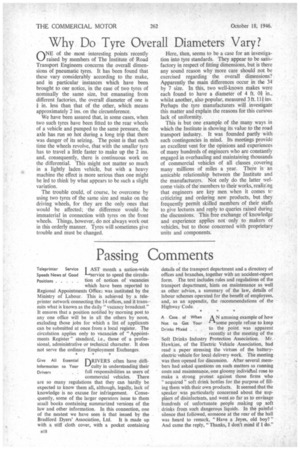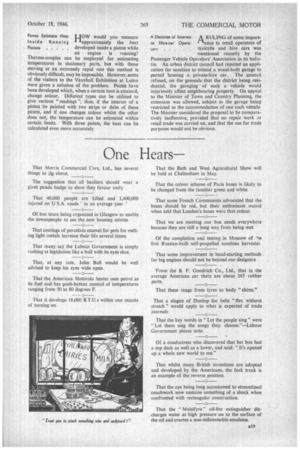Passing Comments
Page 24

Page 25

If you've noticed an error in this article please click here to report it so we can fix it.
Teleprinter Service I AST month a nation-wide Speeds News of Good "service to speed the circula Positions tion of notices of vacancies which have been reported to Regional Appointments Offices was instituted by the Ministry of Labour. This is achieved by a teleprinter network connecting the 14 offices, and it trans-. mits what is known as the daily " vacancy broadcast." It ensures that a position notified by morning post to any one office will be in all the others by noon, excluding those jobs for which a list of applicants can be submitted at once from a local register. The circulation applies only to vacancies of " Appointments Register" standard, i.e., those of a professional, administrative or technical character. It does not serve the ordinary Employment Exchanges.
Give All Essential riR1VERS often have diffi. Information to Your -1—'culty in understanding their Drivers . full responsibilities as users of commercial vehicles. There are SO many regulations that they can hardly be expected to know them all, although, legally, lack of knowledge is no excuse for infringement Consequently, some of the larger operators issue to them small books containing summarized versions of the law and other information. In this connection, one of the neatest we have seen is that issued by the Bradford Dyers* Association, Ltd. It is made up with a stiff cloth cover, with a pocket containing details of the transport department and a directory of offices and branches, together with an accident-report form. The text includes rules and regulations of the transport department, hints on maintenance as well as other advice, a summary of the law, details of labour schemes operated for the benefit of employees, and, as an appendix, the recommendations of the Highway Code.
A Case of When Not to Get Your Drinks Mixed . .
AN amusing example of how some people refuse to keep to the point was apparent . recently at the meeting of the Soft Drinks Industry Protection Association. Mr. Hawkins, of the Electric Vehicle Association, had read a paper stressing the virtues of the batteryelectric vehicle for local delivery work. The meeting was then opened for discussion. After several members had asked questions on such matters as running costs and maintenance, one gloomy individtiaI rose to make a strong protest against those firms who " acquired " soft drink bottles for the purpose of filling them with their own products. It seemed that the speaker was particularly concerned about the suppliers of disinfectants, and went so far as to envisage hundreds of unfortunate people making up soft drinks from such dangerous liquids. In the painful silence that followed, someone at the rear of the hall was heard to remark, "Have a Jeyes, old boy?" And came the reply, "Thanks, I don't mind if I do." pOW would you measure "approximately the heat developed inside a piston while an engine is running? Thermo-couples can be employed for estimating temperatures in stationary parts, but with those moving at an extremely rapid rate this method is obviously difficult, may be impossible. However, some of the visitors to the Vauxhall Exhibition at Luton were given a solution of the problem. Paints have been developed which, when a certain heat is attained, change colour. Different types can be utilized to give various "readings "; thus, if the interior of a piston be painted with two strips or dabs of these paints, and if one changes colour whilst the other does not, the temperature can be estimated within certain limits. With three points, the heat can be calculated even more accurately.
Paints Estimate Heat Inside Running Pistons
A Decision of Interest A RULING of some importto Hire-car Opera"ance to small operators of taxicabs and hire cars was mentioned recently by the Passenger Vehicle Operators' Association in its bulletin. An urban district council had rejected an application for sanction to extend a wood-built garage to
permit housing a private-hire car. The council refused, on the grounds that the district being residential, the garaging of such a vehicle would injuriously affect neighbouring property. On appeal to the Minister of Town and Country Planning, the extension was allowed, subject to the garage being restricted to the accommodation of one such vehicle The Minister considered the proposal to be comparatively inoffensive, provided that no repair work or retail trade was carried on, and that the use for trade purposes would not be obvious. tors .....












































































